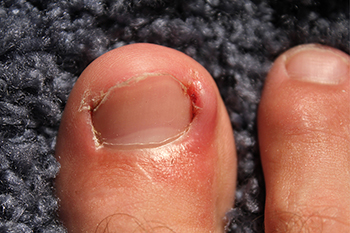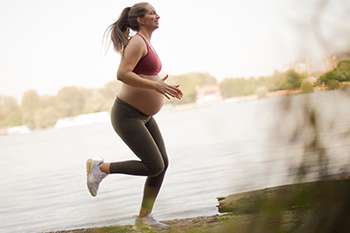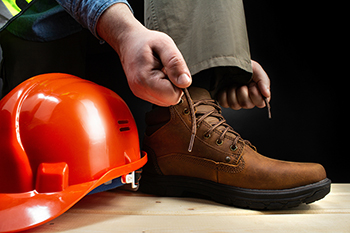Connect With Us
Blog
Items filtered by date: November 2023
Are You Suffering From Ingrown Toenails?
Treatment for Ingrown Toenails

Ingrown toenails can be a painful and persistent issue, usually affecting the big toe and causing discomfort, inflammation, and sometimes bleeding. An ingrown toenail often results from wearing tight shoes, foot injuries, genetics, or poor foot care. When the curved edges of the nail pierce into the surrounding skin, pressure builds up, leading to pain, inflammation, tenderness, and redness. Beyond conservative treatments, there are two primary surgical methods for treatment, which are referred to as partial nail avulsion and total nail avulsion. Both are conducted under local anesthesia. Partial nail avulsion involves removing a portion of the nail, known as a wedge resection. The procedure trims one or both edges of the nail to make it narrower and give it a straight edge. This ingrown toenail treatment takes approximately 30 minutes and has a high success rate. With total nail avulsion, the entire nail is removed. This procedure is often reserved for those with recurrent issues or who are unresponsive to other less invasive ingrown toenail treatments. Proactive toenail care and early intervention are key to addressing ingrown toenails effectively. To manage an exceedingly painful or infected ingrown toenail, it is suggested that you make an appointment with a podiatrist for an exam, in addition to determining if surgery is best for you.
Ingrown toenails may initially present themselves as a minor discomfort, but they may progress into an infection in the skin without proper treatment. For more information about ingrown toenails, contact one of our podiatrists of Garnet & Carbonell, DPM, LLC. Our doctors can provide the care you need to keep you pain-free and on your feet.
Ingrown Toenails
Ingrown toenails are caused when the corner or side of a toenail grows into the soft flesh surrounding it. They often result in redness, swelling, pain, and in some cases, infection. This condition typically affects the big toe and may recur if it is not treated properly.
Causes
- Improper toenail trimming
- Genetics
- Improper shoe fitting
- Injury from pedicures or nail picking
- Abnormal gait
- Poor hygiene
You are more likely to develop an ingrown toenail if you are obese, have diabetes, arthritis, or have any fungal infection in your nails. Additionally, people who have foot or toe deformities are at a higher risk of developing an ingrown toenail.
Symptoms
Some symptoms of ingrown toenails are redness, swelling, and pain. In rare cases, there may be a yellowish drainage coming from the nail.
Treatment
Ignoring an ingrown toenail can have serious complications. Infections of the nail border can progress to a deeper soft-tissue infection, which can then turn into a bone infection. You should always speak with your podiatrist if you suspect you have an ingrown toenail, especially if you have diabetes or poor circulation.
If you have any questions, please feel free to contact our offices located in Palmetto Bay, South Miami, and Homestead, FL . We offer the newest diagnostic and treatment technologies for all your foot care needs.
Does Pregnancy Lead to Changes in Foot Size?

Pregnancy is a transformative journey that brings about numerous changes in a woman's body. While most expectant mothers are well aware of the more obvious alterations, such as weight gain and a growing belly, the potential impact on foot size is a less commonly discussed topic. Many women wonder if their feet will permanently change in size during pregnancy. The answer, in most cases, is possibly. During pregnancy, hormonal changes, particularly the release of relaxin, can affect the ligaments in the body, including those in the feet. This increased flexibility may lead to a temporary, and sometimes permanent, increase in foot size. Additionally, as pregnancy progresses, fluid retention and swelling, known as edema, can cause the feet to become temporarily larger. While swelling typically subsides after childbirth, some women may find that their feet remain slightly larger than they were before pregnancy. Overall, it is important for expectant mothers to be prepared for these potential changes, and consider investing in comfortable, supportive footwear during and after pregnancy to ensure proper foot health and comfort. If you would like more information about how pregnancy can affect the feet, it is suggested that you confer with a podiatrist.
Pregnant women with swollen feet can be treated with a variety of different methods that are readily available. For more information about other cures for swollen feet during pregnancy, consult with one of our podiatrists from Garnet & Carbonell, DPM, LLC. Our doctors will attend to all of your foot and ankle needs.
What Foot Problems Can Arise During Pregnancy?
One problem that can occur is overpronation, which occurs when the arch of the foot flattens and tends to roll inward. This can cause pain and discomfort in your heels while you’re walking or even just standing up, trying to support your baby.
Another problem is edema, or swelling in the extremities. This often affects the feet during pregnancy but tends to occur in the later stages.
How Can I Keep My Feet Healthy During Pregnancy?
- Wearing orthotics can provide extra support for the feet and help distribute weight evenly
- Minimize the amount of time spent walking barefoot
- Wear shoes with good arch support
- Wear shoes that allow for good circulation to the feet
- Elevate feet if you experience swelling
- Massage your feet
- Get regular, light exercise, such as walking, to promote blood circulation to the feet
If you have any questions, please feel free to contact our offices located in Palmetto Bay, South Miami, and Homestead, FL . We offer the newest diagnostic and treatment technologies for all your foot care needs.
Types of Workplace Foot Injuries

Studies have shown the majority of workplace related injuries that affect the feet are punctures, crushing, sprains, lacerations, slips, trips, and falls. Stepping on nails, shards of glass, or other sharp objects can result in puncture wounds to the feet. These injuries can be particularly dangerous, as they can introduce bacteria into the body, possibly leading to infections. Sharp tools and equipment can cause lacerations to the feet, resulting in bleeding and the risk of infection. Slips and falls can be attributed to wet floors, cluttered walkways, or uneven surfaces. When an employee falls, the feet are often the first point of contact with the ground, making them susceptible to injuries such as fractures, sprains, and bruises. Standing for extended periods of time on hard flooring, combined with wearing ill fitting shoes, can lead to foot fatigue. Fatigue can set employees up for further injuries and decrease their alertness. The main way to avoid many of these types of injuries is by wearing protective footwear appropriate for the type of work environment. If you need help managing foot conditions that result from work related injuries, it is suggested that you consult a podiatrist.
While working on the feet, it is important to take the proper care of them. For more information about working on your feet, contact one of our podiatrists from Garnet & Carbonell, DPM, LLC. Our doctors will treat your foot and ankle needs.
Working on Your Feet
Standing on your feet for long periods of time can cause stress and pain in your feet. Your whole body may experience change in terms of posture, back pain, bunions, callouses and or plantar warts. There are ways to avoid these conditions with proper foot care, smart choices and correct posture.
Positive Changes
Negative heeled shoe – Choosing this shoe type places the heel slightly lower than the ball of the foot. These are great for overall foot health. Find shoes that fit you correctly.
Go barefoot – Our feet were not designed to be enclosed for all hours of the day. Try to periodically expose your feet to air.
Eliminate Pain
Foot Exercises – Performing simple exercises, incorporating yoga and doing stretches are beneficial. This will allow increased blood flow to the area and muscles of the foot.
Achilles tendon – Stretching the foot out flat on the floor will relax the calf muscles and tendon. These exercises can be performed almost anywhere. Make sure you add these exercises to your daily regimen.
With a little bit of this information and knowing more about foot health, you will notice changes. Foot stretches and proper footwear will help with pain and prevent further issues.
If you have any questions please contact our offices located in Palmetto Bay, South Miami, and Homestead, FL . We offer the newest diagnostic and treatment technologies for all your foot and ankle needs.
Developmental Milestones and Children’s Feet

Children's feet go through remarkable transformations, shifting from their spongy, soft state in the pre-crawling phase, to rapidly growing during their initial years. As children move into the crawling stage, their feet become more delicate, and soft, protective footwear is suggested. When they take their first steps, the need for proper walking shoes arises, given the fast bone development. Entering pre-school, kids are more active, necessitating diverse shoe styles. By school age, feet have evolved significantly, and shoes should be sought for increased activity. To ensure the well-being of your child's developing feet and proper shoes for each milestone achieved, it is suggested that you make an appointment with a podiatrist for guidance on proper foot care that will benefit them throughout life.
The health of a child’s feet is vital to their overall well-being. If you have any questions regarding foot health, contact one of our podiatrists of Garnet & Carbonell, DPM, LLC. Our doctors can provide the care you need to keep you pain-free and on your feet.
Tips for Keeping Children's Feet Healthy
- Make sure their shoes fit properly
- Look for any signs of in-toeing or out-toeing
- Check to see if they have Clubfoot (condition that affects your child’s foot and ankle, twisting the heel and toes inward) which is one of the most common nonmajor birth defects.
- Lightly cover your baby’s feet (Tight covers may keep your baby from moving their feet freely, and could prevent normal development)
- Allow your toddler to go shoeless (Shoes can be restricting for a young child’s foot)
- Cut toenails straight across to avoid ingrown toenails
- Keep your child’s foot clean and dry
- Cover cuts and scrapes. Wash any scratches with soap and water and cover them with a bandage until they’ve healed.
If you have any questions, please feel free to contact our offices located in Palmetto Bay, South Miami, and Homestead, FL . We offer the newest diagnostic and treatment technologies for all your foot care needs.

